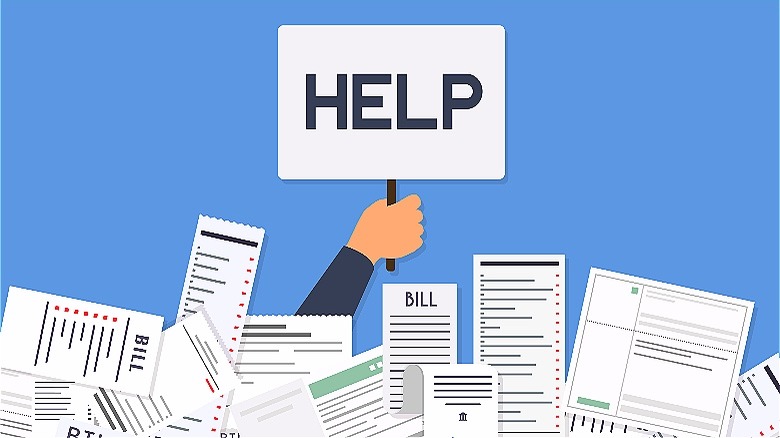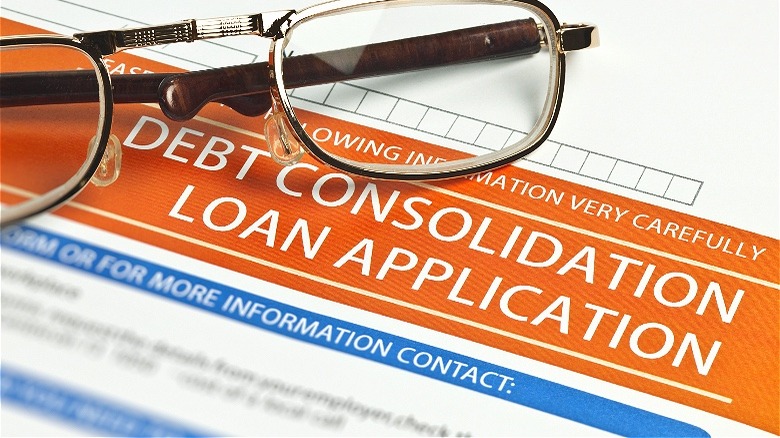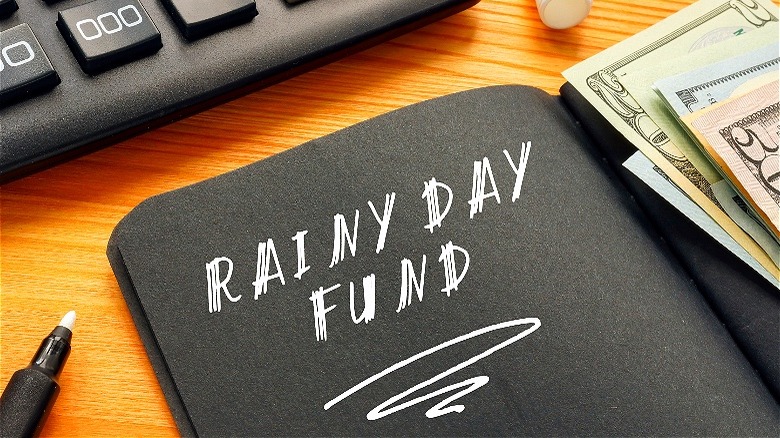5 Crucial Warning Signs That You're Heading Toward Bankruptcy
Bankruptcy is a catastrophic financial outcome that looms large in the budgetary math of many Americans. More than 433,000 people filed for bankruptcy between October 2022 and September 2023, a marked increase from the 12 months prior. Business bankruptcy filings also rose during this time — 29.9% over the prior year among this contingent — with 17,051 total filings submitted (via the United States Courts). Bankruptcy is a legitimate financial lifeline for those who need it most, but the damage that using it creates in an individual's life makes it a weapon of last resort. Bankruptcy is something that most people will want to avoid unless it's absolutely unavoidable.
Fortunately, there are some warning signs that consumers can stay on the lookout for, which can help illuminate a financially fraught path so that a different direction may be taken to steer clear of increasingly dangerous financial waters. In a conversation with Alaina Fingal, a Certified Money Coach® and owner of The Organized Money, we get to the bottom of some of the most important warning signs that can signal things are headed toward financial trouble. Whether it's difficulties maintaining routine bill payments or an unpreparedness to weather an unexpected financial storm, these are five key features to stay vigilant about when identifying a potential fall into bankruptcy territory.
1. An inability to pay monthly bills on time
"The earliest warning sign of bankruptcy is being low on cash and being unable to pay bills on time each month," Alaina Fingal explained. "Being low on cash and unable to cover every expense that you currently have means that your expenses are higher than your current income." Finding yourself underwater financially can be a scary thing, but it's something that you'll have to come to grips with and work to change if you find this imbalance in your own budgeting.
Added Fingal, "This is a danger zone and for most people can only last for a few months to a few years before it starts to have a major impact on our livelihood." If you aren't able to cut spending or do something to increase your income then, it's only a matter of time before the scales start to tip increasingly and precariously against you. In another iteration of this hardship, you may find yourself increasingly relying on savings accounts or investment funds to make up the difference between your income dollars and the expenses you maintain. This supplement can only last so long, and once it's gone, you'll be left without any safety net whatsoever and more vulnerable to bankruptcy.
2. Not qualifying for debt management programs
Alaina Fingal points consumers toward newly restrictive cash flow as one of the earliest signs of an imminent bankruptcy. But she also speaks about a secondary problem that people may run into when working through options to put themselves back on even financial footing. Said Fingal, "In addition to not having cash on hand, one of the biggest signs that will lead to bankruptcy is not having the ability to qualify for any debt management programs."
"Looking for programs or options when low on cash is vital to financial stability. When options are low and people do not qualify for any debt consolidation or debt management programs, they are in serious danger of filing for bankruptcy," she said. A slippery financial slope can quickly turn a squeeze in your budget into an all-out panic. But it may be too late to act in any meaningful way if you've let the problem metastasize. Increasing credit card reliance (without an equal repayment strategy to maintain good utilization balance), for instance, can lower your credit score over the long term and make new lending products harder to come by. The option to consolidate your debt might ultimately be off the table for some in serious financial trouble.
3. Failing to have a budget in place
In giving a proactive step that people can follow to avoid future bankruptcy filing, Alaina Fingal highlights budgeting above all else. "The best step we can take to avoid bankruptcy is to pay attention to our finances. Many times, challenges with money develop because we aren't paying attention to our finances. Not having a budget in place and not noticing when we have to use credit cards throughout the month (because we have run out of disposable income), can ruin our financial future," she explained. Your budget is your financial roadmap, and without an updated accounting (or any budgetary planning at all), you can easily fall into a situation where spending can run amok since it's taking place untamed and untethered.
Budgeting doesn't have to be difficult or traumatizing, even though it may be a challenge for those who haven't done it before. Essentially, you just need to take a fair accounting of everything you earn and everything you spend your money on each month. Doing this will put you on a radically improved financial footing, even if it's a little painful to do (at the start) after a lengthy break from comprehensive money management practices. As Fingal said, "Putting daily, monthly and annual money routines into place can keep us on track with our money and help us address issues quickly as they arise."
4. The arrival of major life changes
When asked about the circumstances surrounding a typical bankruptcy filing, Alaina Fingal noted a plurality of factors. While some bankruptcies are indeed a result of chronic mismanagement of personal finances, most occur as a result of major events and financial stumbling blocks that can present themselves naturally in the course of life. "With most clients that I have assisted with their personal finances, their bankruptcy was due to multiple factors," she said. "In rare circumstances it can be due to bad financial habits, taking on too much debt, or reckless financial behavior but in my personal experience it is major life challenges that have caused bankruptcy."
"Challenges" is certainly a key concept to focus on when placing bankruptcy into context. For most, this isn't a result of reckless mismanagement or frivolous action, but rather the product of immense challenges that life has randomly placed in a person's path. If you're worried about bankruptcy, the first thing you need to remember is that it's not a reflection of you as a person, and then understand that it's something you can defend against with healthy preparation.
5. The lack of an emergency fund
Perhaps the most important step any consumer can take to ward off the threat of bankruptcy is the establishment and continued cultivation of an emergency fund. Alaina Fingal offers resounding praise for the emergency fund. "Not being financially prepared for a medical emergency, job loss, death of a family member (who provided the main source of income), or an unaffordable large expense (mortgage or car) is usually the culprit" of bankruptcy issues, Fingal said.
"The average American does not have a three-month emergency fund in place and when something happens to their income, they are unable to stay on top of all their expenses. One life event can cause a downward spiral of their finances and they are unable to recover and will file for bankruptcy," she continued. Having the ability to manage a sudden emergency expense or a shutoff of the household's income stream can make the difference between making ends meet and winding up in bankruptcy proceedings. It's simply one of the most consequential aspects of good money management and something that no one can do without.





